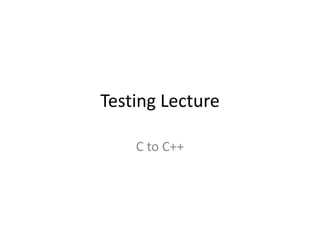
Testing lecture after lec 4
- 1. Testing Lecture C to C++
- 2. You can use / / to type a remark : #include <iostream.h> // This library is often used void main () // The program's main routine. { double a; // Declaration of variable a. a = 456; a = a + a * 21.5 / 100; // A calculation. cout << a; // Display the content of a. }
- 3. Input from keyboard and output to screen can be performed through cout << and cin >> : #include <iostream.h> void main() { int a; // a is an integer variable char s [100]; // s points to a sring of 99 characters cout << "This is a sample program." << endl; cout << endl; // Line feed (end of line) cout << "Type your age : "; cin >> a; cout << "Type your name : "; cin >> s; cout << endl; cout << "Hello " << s << " you're " << a << " old." << endl; cout << endl << endl << "Bye !" << endl; }
- 4. Variables can be declared everywhere: #include <iostream.h> void main () { double a; cout << "Hello, this is a test program." << endl; cout << "Type parameter a : "; cin >> a; a = (a + 1) / 2; double c; c = a * 5 + 1; cout << "c contains : " << c << endl; inti, j; i = 0; j = i + 1; cout << "j contains : " << j << endl; }
- 5. A variable can be initialised by a calculation : #include <iostream.h> void main () { double a = 12 * 3.25; double b = a + 1.112; cout << "a contains : " << a << endl; cout << "b contains : " << b << endl; a = a * 2 + b; double c = a + b * a; cout << "c contains : " << c << endl; }
- 6. Like in C, variables can be encapsulated between hooks : #include <iostream.h> void main() { double a; cout << "Type a number : "; cin >> a; { int a = 1; a = a * 10 + 4; cout << "Local number : " << a << endl; } cout << "You typed : " << a << endl; }
- 7. C++ allows to declare a variable inside the for loop declaration. It's like if the variable hadbeen declared just before the loop : #include <iostream.h> void main () { for (int i = 0; i < 4; i++) { cout << i << endl; } cout << "i contains : " << i << endl; for (i = 0; i < 4; i++) { for (inti = 0; i < 4; i++) // we're between { // previous for's hooks cout << i; } cout << endl; } }
- 8. A global variable can be accessed even if another variable with the same name has beendeclared inside the function : #include <iostream.h> double a = 128; void main () { double a = 256; cout << "Local a : " << a << endl; cout << "Global a : " << ::a << endl; }
- 9. It is possible to make one variable be another : #include <iostream.h> void main () { double a = 3.1415927; double &b = a; // b IS a b = 89; cout << "a contains : " << a << endl; // Displays 89. }
- 10. (If you are used at pointers and absolutely want to know what happens, simply think double &b = a is translated to double *b = &a and all subsequent b are replaced by *b.) The value of REFERENCE b cannot be changed afther its declaration. For example you cannot write, a few lines further, &b = c expecting now b IS c. It won't work. Everything is said on the declaration line of b. Reference b and variable a are married on that line and nothing will separate them.
- 11. References can be used to allow a function to modify a calling variable : #include <iostream.h> void change (double &r, double s) { r = 100; s = 200; } void main () { double k, m; k = 3; m = 4; change (k, m); cout << k << ", " << m << endl; // Displays 100, 4. }
- 12. If you are used at pointers in C and wonder how exactly the program above works, here is howthe C++ compiler translates it (those who are not used at pointers, please skip this ugly piece ofcode) : #include <iostream.h> void change (double *r, double s) { *r = 100; s = 200; } void main () { double k, m; k = 3; m = 4; change (&k, m); cout << k << ", " << m << endl; // Displays 100, 4. } A